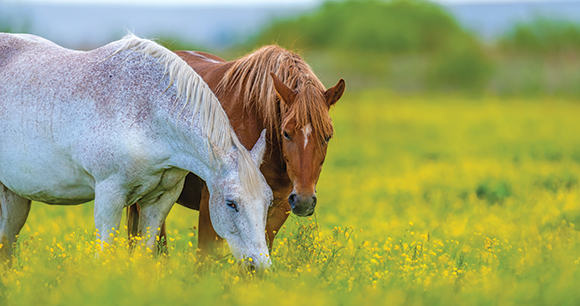Gearing Up for Next Year’s Spending Cycle
For the upcoming fiscal year, beginning October 1, AWI provided members of Congress with a list of priorities covering the welfare of companion animals, farmed animals, marine mammals, and other wildlife. We also submitted testimony to the House and Senate appropriations committees and circulated lawmaker sign-on letters to the committees on important animal welfare issues.

Thirty-three senators and 173 representatives signed on to letters—led by Sen. Ron Wyden (D-OR) and Reps. Chris Smith (R-NJ) and Earl Blumenauer (D-OR)—highlighting measures to bolster enforcement of the Animal Welfare Act and the Horse Protection Act and supporting continued funding for grants to aid domestic violence survivors and their pets. A bipartisan letter led by Reps. Don Beyer (D-VA), Raul Grijalva (D-AZ), and Debbie Dingell (D-MI) requesting full funding for the Endangered Species Act was signed by 137 representatives. Fifty-three representatives joined a letter led by Rep. Jared Huffman (D-CA) in support of funding the Marine Mammal Commission, the Prescott Grant Program (to help stranded marine mammals), and the Unusual Mortality Event Contingency Fund. Letters led by Reps. Vern Buchanan (R-FL) and Jan Schakowsky (D-IL) and Sen. Robert Menendez (D-NJ)—joined by 120 representatives and 26 senators—urged inclusion in fiscal year 2025 legislation of a permanent prohibition on the domestic slaughter of horses.
Seventy-seven representatives and 15 senators signed on to letters—led by Reps. Dina Titus (D-NV), David Schweikert (R-AZ), and Steve Cohen (D-TN) and Sen. Cory Booker (D-NJ)—requesting wild horse and burro management reforms. The reforms would ensure that the Bureau of Land Management expends a significant portion of its budget on proven and safe fertility control methods to keep herds in their natural habitat, as well as bar the use of risky surgical procedures to curb population growth.
Forty-seven representatives joined a bipartisan letter led by Rep. Ro Khanna (D-CA) requesting that livestock operations be required to have disaster preparedness plans in place to protect their animals as a prerequisite to receiving federal compensation for losses incurred during extreme weather events and natural disasters. AWI also worked with lawmakers to advance appropriations language calling for (1) stronger enforcement of the Twenty-Eight Hour law—the main federal statute to protect farmed animals during transport; (2) increased oversight of the handling of birds at slaughter; and (3) shifting the poultry industry away from killing animals via ventilation shutdown plus heat, an inhumane method used widely during the ongoing avian influenza outbreak to destroy flocks exposed to the virus.
Program Terms: All Programs
AWI Quarterly Terms: Government/Legal, Quick Read
Related News
“A Voice for Animals” Contest Winners Devise Practical Strategies to Improve the Lives of Animals
In Program: All ProgramsFrom examining how plastics smother and abrade coral reefs, to spreading awareness about donkeys being sacrificed for the donkey-hide gelatin trade, participants in the 2025...
AWI Mourns Congressman Raúl Grijalva, an Exceptional Champion for Animals
In Program: All ProgramsRep. Raúl Grijalva (D-Ariz.), a staunch advocate for animals and the environment who dedicated half a century to public service, died Thursday at the age...
AWI Scholarship Winners Display Ambition, Ingenuity in Protecting Animals
In Program: All ProgramsThe Animal Welfare Institute (AWI) announced today the 12 winners of a scholarship designed to support high school seniors who are planning to use their...
US Spending Package Includes Multiple Wins for Animals, but Insufficient Funding for Major Welfare and Conservation Priorities
In Program: All ProgramsThe Consolidated Appropriations Act (H.R. 4366) signed into law Saturday includes several important victories for animals, but falls short in a number of key areas,...